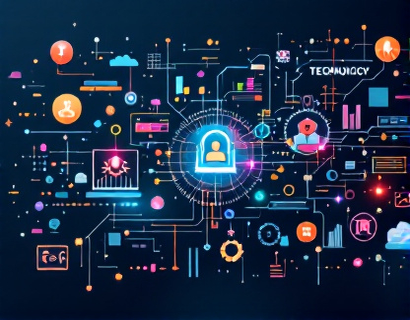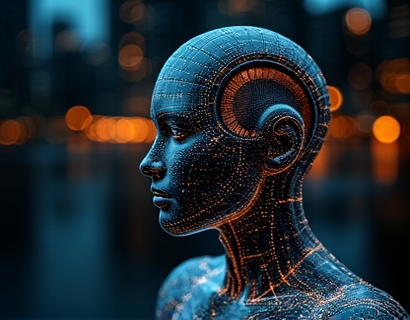Transforming Education with AI-Powered Learning Companions
In the rapidly evolving landscape of education, the integration of artificial intelligence (AI) is revolutionizing the way students and educators access and utilize learning resources. An AI-powered learning companion represents a significant leap forward, offering a personalized and dynamic educational experience. This technology harnesses the power of machine learning algorithms to deliver tailored study insights, industry knowledge, and expert guidance, optimizing the learning journey for enhanced efficiency and effectiveness.
The core functionality of an AI-powered learning companion lies in its ability to understand and adapt to individual learning styles and needs. By analyzing user interactions, preferences, and performance data, the AI system creates a customized educational pathway. This personalized approach ensures that learners receive the most relevant and beneficial information at the right time, fostering a more engaging and productive learning environment.
Personalized Study Resources
One of the most significant advantages of an AI-powered learning companion is its capacity to provide personalized study resources. Traditional educational methods often rely on one-size-fits-all materials, which may not cater to the unique needs of every student. With AI, the learning experience is transformed as the system curates a selection of resources that align with the individual's learning objectives, pace, and style.
For instance, a student studying calculus might receive a mix of video tutorials, interactive quizzes, and detailed text explanations, all tailored to their specific areas of difficulty. The AI continuously monitors progress and adjusts the resource mix to ensure optimal learning outcomes. This dynamic resource allocation not only enhances understanding but also boosts confidence and motivation.
Real-Time Industry Insights
Beyond academic subjects, AI-powered learning companions offer unparalleled access to real-time industry insights. In a world where industries evolve rapidly, staying informed about the latest trends, technologies, and best practices is crucial for success. The AI system aggregates data from various sources, including industry reports, academic journals, and expert opinions, to provide comprehensive and up-to-date information.
For example, a student pursuing a degree in data science can receive insights on emerging technologies such as quantum computing, natural language processing, and blockchain. These insights are presented in a digestible format, allowing learners to stay ahead of the curve and make informed decisions about their career paths. The AI's ability to filter and prioritize relevant information saves time and effort, making it an invaluable tool for both students and professionals.
Expert Knowledge at Your Fingertips
Access to expert knowledge is another cornerstone of an AI-powered learning companion. In traditional educational settings, interaction with experts is often limited by geographical constraints and scheduling conflicts. AI changes this paradigm by connecting learners with a network of subject matter experts through a chat interface.
Users can engage in real-time conversations with experts, asking questions and receiving detailed explanations and guidance. This direct access to expertise not only enhances understanding but also provides valuable networking opportunities. The AI system ensures that the expert's responses are accurate, relevant, and tailored to the user's level of knowledge, creating a rich and interactive learning experience.
Enhanced Learning Efficiency
The efficiency gains from using an AI-powered learning companion are substantial. By automating the process of resource curation and expert consultation, learners can focus more on learning and less on searching for information. The AI acts as a personal assistant, streamlining the educational process and maximizing the use of time.
Moreover, the AI's adaptive learning algorithms continuously refine the educational experience based on user feedback and performance data. This continuous improvement ensures that the system remains effective and relevant, adapting to the evolving needs of the learner. The result is a more efficient and effective learning journey, with fewer obstacles and more achievements.
Support for Diverse Learning Needs
One of the most inclusive aspects of AI-powered learning companions is their ability to support diverse learning needs. Whether a student is a visual learner, an auditory learner, or prefers hands-on activities, the AI can adapt the presentation of information to suit individual preferences. This flexibility ensures that all learners, regardless of their learning style, can benefit from the same high-quality educational resources.
Additionally, the AI can identify and address learning gaps, providing targeted support to areas where the student may be struggling. This proactive approach helps prevent frustration and burnout, fostering a positive and supportive learning environment. The AI's ability to recognize and respond to emotional cues also contributes to a more empathetic and engaging educational experience.
Collaborative Learning Opportunities
AI-powered learning companions do not operate in isolation; they facilitate collaborative learning by connecting students with peers who share similar interests and goals. The AI can match learners for study groups, project collaborations, and discussion forums, enhancing the social aspect of education.
These collaborative opportunities not only enrich the learning experience but also develop essential skills such as teamwork, communication, and problem-solving. The AI monitors group dynamics and provides guidance to ensure productive and respectful interactions, further enhancing the value of collaborative learning.
Continuous Skill Development
In a rapidly changing job market, continuous skill development is essential for long-term success. An AI-powered learning companion supports this by offering ongoing learning paths that align with industry demands and personal career aspirations. The system identifies skill gaps and recommends courses, certifications, and practical projects to help learners stay competitive.
For professionals looking to upskill or reskill, the AI provides a structured and flexible learning plan that fits into busy schedules. Whether it's learning a new programming language, mastering a software tool, or understanding regulatory changes in a specific industry, the AI ensures that learners have the resources and support they need to succeed.
Data-Driven Insights for Educators
The benefits of AI-powered learning companions extend beyond students to educators as well. Educators can leverage the data and insights generated by the AI to refine their teaching methods and improve student outcomes. The AI provides detailed analytics on student performance, highlighting areas of strength and weakness.
These insights enable educators to tailor their instruction, provide targeted interventions, and create more engaging lesson plans. The AI can also suggest innovative teaching strategies based on best practices and research findings, helping educators stay at the forefront of educational innovation. This data-driven approach not only enhances the learning experience but also supports the professional growth of educators.
Challenges and Considerations
While the potential of AI-powered learning companions is vast, there are challenges and considerations to address. Ensuring data privacy and security is paramount, as sensitive student information must be protected. Transparent data usage policies and robust security measures are essential to build trust and confidence in the technology.
Another consideration is the digital divide, where not all students have equal access to the necessary technology and internet connectivity. Efforts to bridge this gap, such as providing affordable devices and expanding internet access, are crucial to ensure that the benefits of AI-powered learning are accessible to all.
Future Prospects
The future of AI-powered learning companions is promising, with ongoing advancements in AI technology poised to further enhance the educational experience. Integration with virtual and augmented reality, for example, can create immersive learning environments that simulate real-world scenarios, making complex concepts more tangible and engaging.
Additionally, the development of more sophisticated natural language processing capabilities will improve the quality and nuance of interactions between learners and the AI. As the technology continues to evolve, the potential for personalized, effective, and enjoyable learning will only grow, shaping the future of education in profound ways.









































